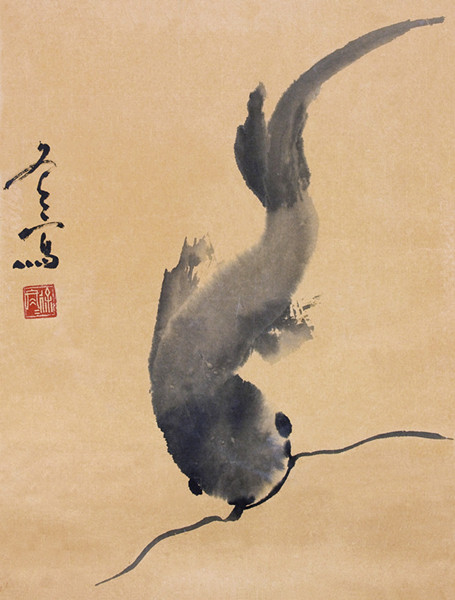 |
|
A file photo of Xu's work. |
Initiator of Chinese-style Abstract Painting
As early as the 1980s, while he was studying Chinese painting, Xu began paying attention to the study and understanding of Western art. However, according to Xu, it was not simply a personal preference that drew him in, but a tendency brought about by cultural exchanges and social progress at that time. "I got to know Western paintings by studying the works of the Father of the Renaissance, Giotto di Bondone. My style is also greatly influenced by such prominent artists as Italian Renaissance painters Masaccio, Leonardo da Vinci, Michelangelo and Raphael; Titian of the Venetian school; Baroque painters Caravaggio and Rubens; Goya of neoclassicism; impressionists Manet and Monet; post-impressionists Gauguin and Van Gogh; Matisse of the Fauvism style; Picasso of Cubism; Cézanne, Mondrian and Chagall," Xu explained.
Over the decades, Xu's artistic style transformed from traditional Chinese painting focusing on freehand brushworks to impressionism and later to abstract painting. It was not a smooth path, and one rare among Chinese painters. In 2003, he moved to the outskirts of Beijing and lived in seclusion to totally focus on artistic creation.
Xu Dongdong strives to integrate abstract art into Chinese painting while combining it with Chinese philosophy. Other than simply imitating Western abstract art, Xu hopes to create abstract paintings featuring Chinese perceptions that showcase Chinese society and life.
"Initiating a Chinese abstract painting style is not a destination for me. I want to create Chinese paintings that are rooted in local philosophy," Xu explained. "I once put forward the idea of highlighting an artistic conception of the mind in traditional freehand brushworks. Having been engaged in art for nearly 40 years, my understanding of this theory is deepening."
Xu's idea was inspired by remarkable Chinese philosophers of the Song (960-1279) and Ming (1368-1644) dynasties, who emphasized the importance of the mind and soul in creating an artistic mood for painting. In his 40s, he broadened this aesthetic concept to the philosophical field – discovering from nature and displaying the natural beauty of humankind and all creatures as well as the appeal of change. In a sense, his artistic concept has turned towards his own attitudes towards life and lifestyle.
Xu's paintings created at different stages of his life are collected in a recently completed album named after his theory, Xin Zao Jing, namely the mind and soul of artists that determine the spirit of their works. From the book, we can clearly see his developments in painting art. Combining the philosophies and creative techniques of China and the West, Xu has endeavored to perfect the art of Chinese-style abstract painting.